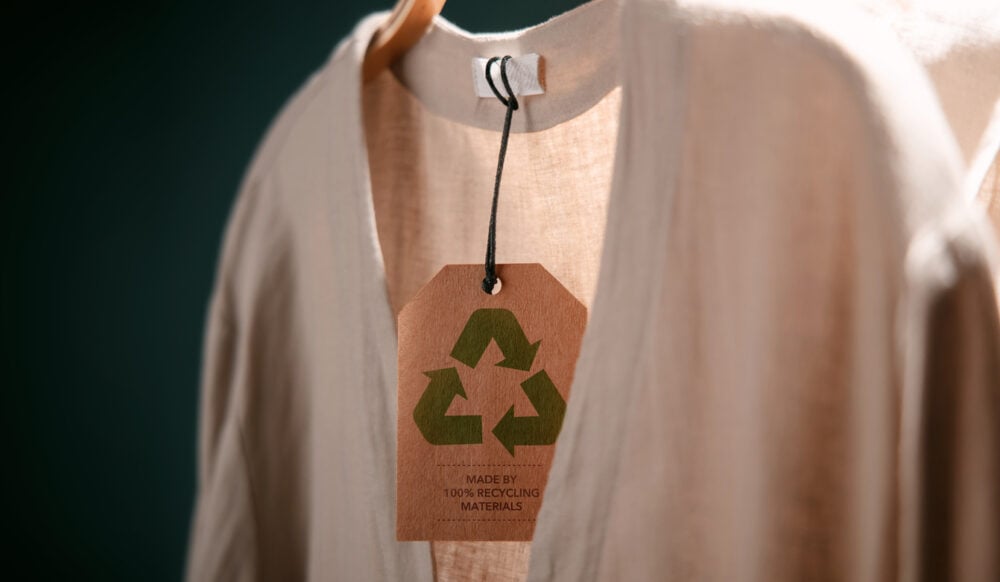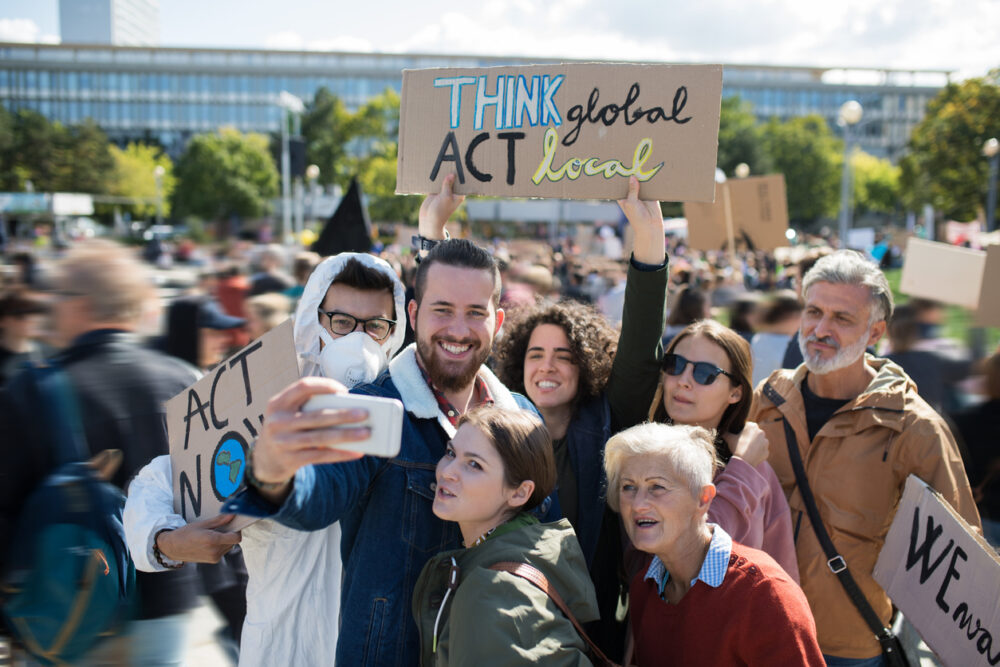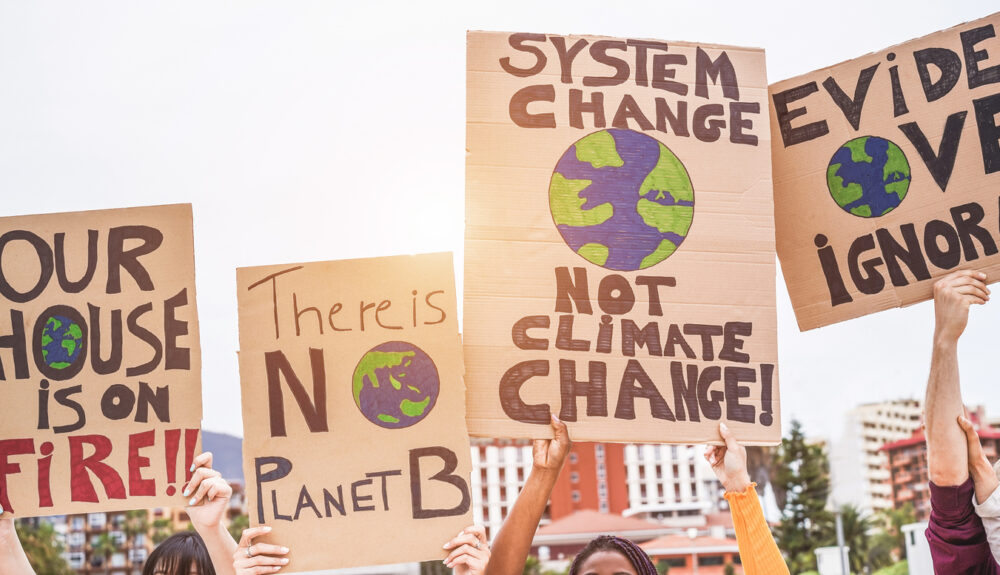It used to feel like a cause, but now it just feels like content.

There was a time when caring about the Earth felt like a radical act. It meant making hard choices, asking real questions, and building something outside the system. It wasn’t polished. It wasn’t pretty. It was messy, emotional, and deeply personal. Now? It feels like something you’re supposed to perform. Something you curate for your grid. Something you buy your way into.
This isn’t about gatekeeping. It’s about grief. The environmental movement used to be about collective urgency. Now it’s filtered through brands, trends, and shallow slogans. You still care. A lot of us still do. But the culture around climate action has changed—and not always for the better. These 11 trends capture what it feels like to watch something meaningful turn into something marketable.
1. The “aesthetic” became more important than the impact.

You used to bring your mismatched jars to the co-op and feel like you were part of something. Now, sustainability lives on perfectly lit countertops. Zero-waste doesn’t mean waste-free—it means beige, bamboo, and photogenic. It’s more about how your efforts look than what they actually change.
This shift matters. When image starts driving action, the messier, less clickable parts of the movement fall away. Composting doesn’t go viral.
Kim Kelly writes in Literary Hub that mutual aid isn’t built to make money—it’s about people helping each other, not turning a profit. And the more polished everything looks, the more people feel like they can’t participate unless they’re doing it “perfectly.” The original spirit—imperfect, collective, urgent—gets lost under the weight of looking good.
2. Products replaced practices.

Once, sustainability was about using less. Making do. Patching holes. Now, it’s about buying “better.” You’re not asked to consume less—you’re asked to upgrade your consumption. Katherine White and her co-authors point out in Harvard Business Review that marketers often position eco-friendly products as the main solution, making green consumption feel like environmental activism. Want to save the planet? Buy the eco version.
But consumption in new packaging is still consumption. Swapping one product for another doesn’t address the systems underneath. It just soothes the guilt. And when personal responsibility becomes another market, the deeper conversations about extraction, labor, and global inequality get pushed to the background. We’re not failing because we picked the wrong tote bag. We’re being sold distraction dressed as progress.
3. Activism turned into content creation.

Protesting used to mean showing up. Making noise. Risking something. Now, it often means filming a video in front of a protest sign and leaving before things get uncomfortable. The pressure to document your care—to post it, aestheticize it, brand it—can start to feel louder than the cause itself.
That doesn’t mean people don’t care. But it does mean the lines have blurred. Alec Tyson and others report in Pew Research Center that younger generations are more likely to express concern about climate change through social media engagement than through traditional activism.
Collective action becomes a trending hashtag. And somewhere in all of it, the urgency gets diluted by the algorithm. The problem isn’t visibility—it’s performance. When activism becomes about engagement rates, the soul of the movement gets edited out.
4. It’s easier to change your soap than challenge your power.

The average person is told to recycle better, buy cleaner, and check ingredients. And those things do matter—but they’re also the least threatening to the status quo. Meanwhile, the companies and governments causing the most harm rarely face consequences. Instead, we’re all kept busy trying to optimize our grocery lists.
That focus on personal change can be empowering—but it can also be a distraction. It puts the burden of change on individuals while letting institutions off the hook. It feels satisfying to “do your part.” But your body knows it’s not enough. That disconnect between effort and impact creates burnout, frustration, and eventually, disengagement. It’s not that you’re not doing enough—it’s that you were never meant to do it alone.
5. Climate grief became a vibe instead of a call to action.

There’s nothing wrong with talking about eco-anxiety. In fact, it’s crucial. But when climate dread becomes a trending identity—just another mood to post about—it can lose its connection to action and community. You start to feel alone in your feelings, even when everyone’s talking about them. Instead of organizing or resourcing each other, people end up looping in guilt and overwhelm.
The feelings are valid. But they weren’t meant to stop there. They’re meant to move us, bind us, wake us up. When grief is held collectively, it can mobilize. But when it’s stylized and siloed, it just lingers, unprocessed, and quietly paralyzing.
6. The movement lost its messiness—and its humanity.

Real sustainability isn’t clean. It’s not minimalist or influencer-ready. It’s patchwork clothes, reused plastic, windowsill herbs, and ugly repair jobs that keep things out of the landfill. But when the movement became aspirational, it started to feel exclusive. Like you couldn’t participate unless you could afford the “right” tools.
That gatekeeping might not be intentional, but it’s real. It makes the eco movement feel like a club instead of a community. And it leaves out the people who’ve been living sustainably out of necessity long before it became cool. When care becomes branding, a lot of people stop feeling welcome. And the movement loses its soul in the process.
7. Mutual aid was replaced with marketplace solutions.

Once, the eco movement was about sharing tools, mending clothes together, swapping seeds, and showing up for each other. Mutual aid wasn’t a trend—it was a survival strategy rooted in solidarity. Now, that sense of community care has been replaced by curated “solutions” you can add to your cart.
Instead of pooling resources, we’re nudged to purchase them individually. Instead of learning from Indigenous knowledge or low-income communities that have always lived resourcefully, we’re taught to look to influencers and startups for answers.
Buying replaces building. And collective wisdom is buried under influencer affiliate links and Etsy shops. The shift isn’t just frustrating—it’s lonely. Because deep down, most of us aren’t looking for a compostable phone case. We’re looking for each other.
8. Working-class sustainability got erased.

Low-waste living isn’t new. Neither is reusing, mending, borrowing, or making do. But when the movement got trendy, a lot of its roots were erased. Suddenly, sustainability was framed as a luxury—something for people with money, time, and perfect lighting. The resourceful practices of working-class and marginalized communities were ignored or rebranded as something novel.
The message became clear: sustainability is something you do after you have your life together. That framing erases the people who’ve been living with less—not by choice, but by necessity—and makes it seem like caring for the Earth is only for the comfortable. It strips the movement of its intersectionality, its humility, and its real-world grounding. And it pushes people out instead of drawing them in.
9. Urgency got rebranded as optimism.

Hope can be powerful, but lately, it’s being used as a cover. Climate campaigns lean into soft pastel aesthetics and cheerful slogans about “building a better future.” Corporations post vague commitments. Politicians wear recycled suits. Everyone wants to seem positive—while avoiding the panic that might actually force change. That curated optimism can feel alienating if you’re sitting with real fear. You start to wonder if you’re being dramatic, or too negative, just because you’re acknowledging the scale of what’s happening. But the truth is, fear has always been part of movements that matter.
So has anger. So has urgency. If we can’t speak from that place anymore—if it’s considered too messy for the brand—then we’re not telling the truth. And that’s where people start to check out.
10. Individual “branding” replaced collective belonging.

There was a time when being part of the eco movement meant aligning with a shared set of values. You didn’t need to look a certain way or explain your identity in hashtags. You just showed up. Now, sustainability often feels like a niche identity you have to perform to be taken seriously—#plantmom, #cleangirlie, #slowfashionbabe.
This shift turns participation into a personality. It creates pressure to market your care instead of live it. And it reinforces the lie that you’re only valid if you fit a certain aesthetic mold. But climate collapse doesn’t care how curated your grid is. And the movement shouldn’t either. What we need is messy, imperfect, widespread engagement—not the right vibe.
11. The sacred got stripped out.

For many, the Earth is more than just “nature.” It’s something sacred—ancestral, spiritual, alive. But as the movement grew more marketable, the reverence began to fade. What once felt like connection now feels transactional. We talk about the planet like a resource to protect, not a relationship to nurture.
That shift matters. When you feel spiritually connected to the Earth, care becomes intuitive. You don’t need a checklist—you feel it in your bones. But when that connection is replaced by campaigns and branding, it’s easier to go numb.
You start to care from the neck up. And eventually, you burn out. Because what we’re missing isn’t just action. It’s awe. It’s grief. It’s love. And without those things, sustainability becomes just another lifestyle instead of a lifeline.